Birmingham and the rebirth of hip-hop
November 27, 2015

Wolverhampton B Boys with Hip Hop founder Afrika Bambaataa in 1985. Source: The Birmingham Press
High profile contemporary hip-hop artists like Drake and Kendrick Lamar have renewed the accessibility of American-style hip-hop, with Drake selling almost 10 million albums worldwide. This recent chart success suggests a rekindling of the international popularity hip-hop enjoyed in the 90s, when the genre was represented by artists such as Tupac and N.W.A.
Across the pond, London has always been synonymous with UK hip-hop. Artists like the Roll Deep crew (featuring Wiley) and, later, Kano, and Dizzee Rascal, popularised the underground grime movement. The appeal of these and other grime artists like the Boy Better Know collective brought the originally London-centric grime movement to a wider fanbase. Birmingham has had its roots ingrained in the transatlantic hip-hop scene since the second city first felt the influence of Afrika Bambaata, but it is arguably experiencing a rebirth now in tandem with the resurgent popularity of high profile hip-hop.
When artist and social activist Afrika Bambaata arrived to the UK in 1982 as part of the ‘Roxy Tour’ he helped to energise artists, such as Moorish Delta 7 and Brothers and Sisters, who formed a strong lineage of hip-hop artists to come from the Birmingham area. The influence of Afrika Bambaata was also prevalent with such artists as DJ Sparra (twice winner of the DMC championships) and in turn these artists made Birmingham hip-hop more prominent.
Moorish Delta 7 is arguably one of the biggest hip-hop acts to come out of Birmingham. Selling over 50,000 records and performing alongside Afrika Bambaata they have had a strong influence on the Birmingham music scene and beyond. Their impact came not just from their dark beats and intense subject matter but also through their engagement with community projects at the grassroots level of music and arts.
Politics is inevitably entwined with music. Afrika Bambaata helped to engage disenfranchised youths through his part in the group Zulu Nation (formed in 1973). The influence hip-hop can wield amongst younger people has been outlined by S. Craig Watkins in the book Hip Hop Matters: Politics, Pop Culture, and the Struggle for the Soul of a Movement.
During the 2004 US Presidential election both parties were concerned by the relative unreliability of youth voter turnout. But it was to be a watershed moment, with 4.6 million more young people using their vote than in 2000. Watkins argues that this significant increase in youth political engagement was in part due to civic groups using hip-hop music and other aspects of popular culture to mobilise young people and get out the “hip-hop vote”.
The resurgence of popular hip-hop is represented by international tours visiting cities such as Birmingham. Last month two of hip-hop’s biggest rising stars, ASAP Rocky (part of the ASAP Mob) and Wiz Khalifa (founder and part of the Taylor Gang record label), sold out the Genting Arena with a fantastic show. It may be surprising to some that they sold out the 16,000 capacity, but for those who know hip-hop fans in Birmingham it should not be a shock. Similarly, the popularity of hip-hop in Manchester, as evidenced by artists such as Bugzy Malone breaking through, is changing the stereotype that Mancunians are only interested in house acts like The Happy Mondays and indie ones like Oasis.
Birmingham is seeing a revival in its home-grown hip-hop scene, particularly grime. Artists staying ‘independent’ is a key reason why those outside Birmingham might not have heard of the rising artists within. But, the likes of the Invasion movement (including both Sox and Jaykae) show that grassroots hip-hop has an enduring hold in the second city. There is a huge range of untapped talent within the area yet to be recognised by the mainstream record labels. Arguably the most well-known grime act to come from Birmingham in recent years is Preditah, who is now part of the BBK movement. The idea of a steady growth in the grime movement within Birmingham was postulated by Skepta, in 2013, who compared grime in Birmingham to the unique hip-hop made in the American south (e.g. Trap).
Ultimately, the growth of grime & hip-hop in Birmingham can be paralleled to its growth internationally. Artists like Drake and the Young Money label have created a new generation of hip-hop fans and made new inroads into popular consciousness. Arguably the genre is becoming more mainstream once again, with many hip-hop artists currently appearing in the charts and selling out arenas. Hopefully, the current popularity of high profile hip-hop artists will continue to feed fans’ interest in Birmingham’s local talent, and the scene will thrive for many years to come.




Comments